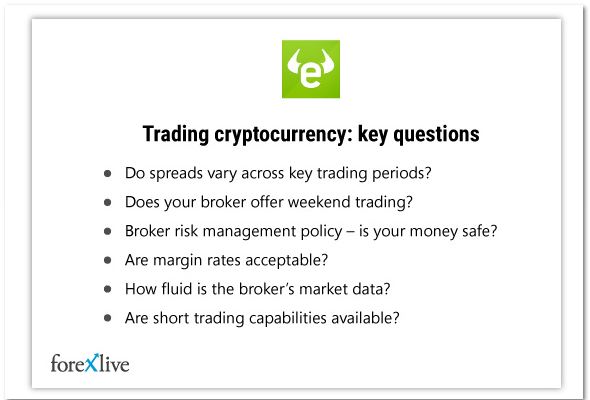Vital information for cryptocurrency traders 11 Sept
Every forex and CFD broker seems to be offering bitcoin and/or ethereum trading nowadays. On the surface, they all seem the same. But, we all know the basics that spreads and margin vary by broker to distinguish their crypto offering.
CHECK OUT LIVE CRYPTOCURRENCY TRADING
Beyond the simple differences in trading conditions, what else should traders keep in mind when choosing a broker to trade cryptocurrencies?
Spreads during liquidity gaps
Forex traders know that there is a big difference between normal market spreads and spreads during volatile periods such as pre/post economic news announcements. That broker with a 0.2 pip EURUSD spread suddenly becomes untradable during volatile periods with spreads bouncing between 5-20 pips.
This problem also exists for cryptocurrencies. Bitcoin and ethereum CFDs are similar to forex products in that they are priced using an external market price.
This may be an API direct from an exchange or aggregated feed from a market provider such as Leverate, TakeProfit Technology or B2Broker. Currently, the market is very fractured with various types of market data and quality.
Before choosing a broker, traders should eye broker spreads of their cryptocurrencies during several different trading periods.
Examples are the dull 4-6 PM EST period for markets and when crypto markets are moving. These two poles of volatility are a good proxy for seeing what a brokers spreads are like when liquidity tends to dry up.

Weekend hours?
Another feature to investigate are weekend trading hours. While the FX, equity and futures market closes for the weekend, cryptos don't. Buying a bitcoin on a crypto exchange on Sunday is just as easy as during peak trading hours on a Wednesday.
However, despite crypto exchanges being open, a broker and their market data providers may not want to be. Therefore, not every broker supports weekend trading. As a result, if the bitcoin and ethereum market is moving during the weekend, FX and CFD traders may not be able to react if their broker is closed.
How do they hedge?
Ok, a broker probably won't answer whether they are hedging their cryptocurrency traders and with who. Nonetheless, this is an important question to push brokers on. Every now and then, you do find a dealer willing to provide enough information, that the client can read between the lines to understand the truth.
The reason hedging is important is it provides clarity on a broker's risk management policies. Due to volatility in bitcoins and other cryptos, brokers that are unhedged are more exposed to large losses caused by their client base. This in turn could lead to wider spreads and higher overall costs to trade with the broker.
Commissions and margin
When trading cryptocurrencies, traders should keep in mind that they are priced more similarly to equities than forex. Therefore, in addition to wider spreads, many brokers also charge a commission on crypto trades. This increases the overall cost of trading and shouldn't be overlooked.
Also, like equities, margin requirements on cryptos are much higher than that of FX and popular CFDs.
Therefore, leverage on bitcoins and similar products is often 10x or lower. Depending on a trader's strategies and risk tolerance, margin rates could be an important factor of which broker they use.
Market data legitimacy
Beyond just its effect on spreads, understanding a broker's market data for pricing crypto CFDs is also important for the future quality of the product. A recent example is BTC-e, a very popular bitcoin trading platform that got closed by the Feds.
One of the biggest non-Chinese bitcoin exchanges, BTC-e was also the first to embrace the retail FX trading industry. As a result, they both launched an MT4 version of their exchange as well as provided crypto liquidity to brokers.
When BTC-e was closed down, any broker that relied solely on BTC-e was stuck without a hedging option or market data to price their bitcoin CFDs. This scenario also existed when Mt Gox closed down in early 2014, taking down market data for many brokers and forex technology providers.
Short sales?
Does a broker offer short trades of their cryptocurrency products? Due to only a handful of hedging solutions for opening short trades, many brokers limit their crypto products to 'long' only.
As shorting is an important strategy, for many, trading with a broker that doesn't allow shorting cryptocurrencies is a non-starter. This is especially the case with bitcoins and other cryptocurrencies that are viewed to be in a bubble and prone to sharp 10-15% intraday drops where shorting would be profitable.
This article is provided by eToro, an FCA regulated social trading investment network. Get daily cryptocurrency analysis here.




